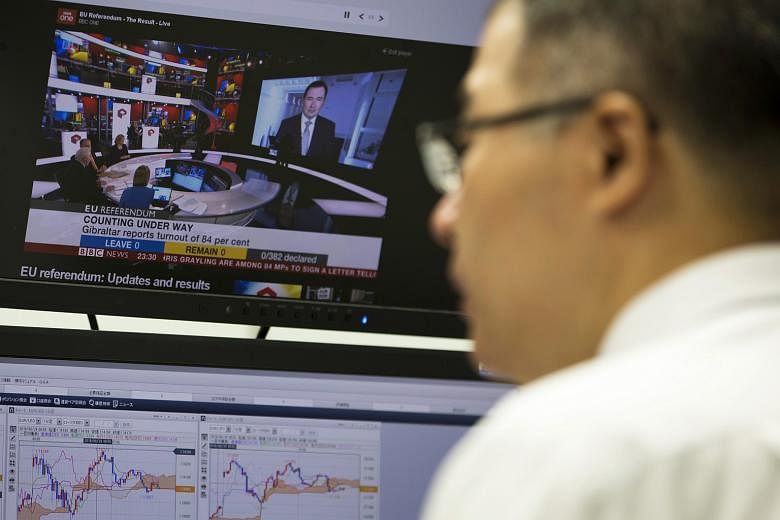LONDON/VIENNA • Turmoil unleashed by Britain's vote to leave the European Union heightened anxiety in Asia yesterday, with China, Japan and South Korea fretting over the risk to global financial stability a few hours before markets open today.
The sterling fell as much as 10 per cent against the dollar last Friday to levels last seen in 1985, while world stocks saw more than US$2 trillion (S$2.7 trillion) wiped off their value.
The weekend gave some respite from the turmoil, but apprehension grew as markets reopen today.
Analysts expect volatility to continue.
A Nomura report said that the "extreme uncertainty" in the City of London, one of the world's largest financial centres, is anathema to global financial markets.
OCBC Bank currency economist Emmanuel Ng said the sterling will be the hardest hit, possibly weakening further to US$1.30 against the greenback.
Chinese Finance Minister Lou Jiwei said the vote "will cast a shadow over the global economy".
"It's difficult to predict now," he said at the first annual meeting of the Asian Infrastructure Investment Bank in Beijing yesterday.
"The knee-jerk reaction from the market is probably a bit excessive and needs to calm down and take an objective view," he added.
Nevertheless, Japan fretted over the effect on the global currency market and contemplated official action. "Speculative, violent moves have extremely negative effects," said Ms Tomomi Inada, policy chief of the ruling Liberal Democratic Party, according to Nikkei daily.
"If necessary, the government should not hesitate to respond, including currency intervention."
Prime Minister Shinzo Abe has tried to engineer a weaker yen to encourage exports to help revive the Japanese economy.
But after initial success, investors have sought safety in the yen this year due to stock market turmoil, and now the Brexit vote, pushing the currency back up.
South Korea's finance minister also said he feared markets will remain volatile throughout negotiations on the British exit.
Hong Kong's finance chief promised his government was keeping a close eye on developments after what he described as "a big surprise" from the referendum result.
Meanwhile, the head of the Bank for International Settlements (BIS) said major central banks will limit market turbulence as much as possible.
Some of the world's biggest central banks offered financial backstops last Friday to soothe plunging markets after the British referendum.
Some intervened in currency markets as they worried that the volatility could hit growth.
"There is likely to be a period of uncertainty and adjustment," said Mr Jaime Caruana, head of BIS, the Switzerland-based forum of major central banks.
"With good cooperation at the global level, I am confident that uncertainty can be contained and that adjustments will proceed as smoothly as possible," he noted.
The Bank of England has offered to provide more than £250 billion (S$462.3 billion) plus "substantial" access to foreign currency to ease any squeeze in markets.
Meanwhile, governor Mark Carney has said it would consider more measures if needed.
The United States Federal Reserve has said it is ready to provide dollar liquidity through its swap lines with central banks to address pressures in global funding markets.
REUTERS

